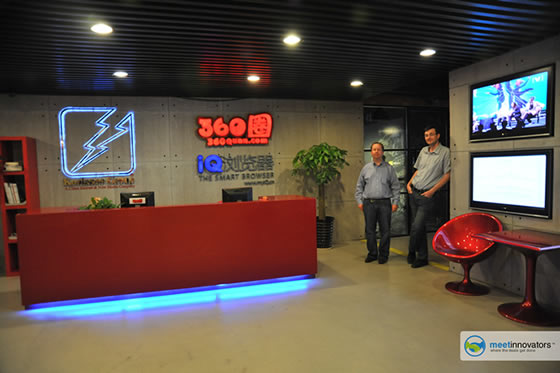
- Meet Dan Brody, a former American Google guy running a Chinese incubator
- See photos of one of the most spectacular offices I saw in China
- Find out about how they are building some of the top kids social networking sites
This interview was arranged by Georg Godula and Markus Fuhrmann from Web2Asia.com
Full Interview Audio and Transcript
Personal Info
Hobbies and Interests: Volleyball, Triathlons.
Sports teams: Boston Red Sox, Boston Celtics, and Miami Dolphins.
Favourite Books:
- To Change China by Jonathan D. Spence
- Foundation by Isaac Asimov
Favourite Entrepreneurs: Sergey Brin, Larry Page.
Twitter url: http://twitter.com/danbrody
Company website: http://www.360quan.com
Fast Track Interview
Adrian Bye: I am talking with Dan Brody who is the CEO of 360quan.com, which is part of the Koolanoo Group. Dan is a pretty interesting guy. He certainly speaks Chinese very well and is probably more integrated than most foreigners that I’ve come across here. Dan, tell us about who you are and where you grew up.
Dan Brody: I wish I had a log cabin story to start out with, but I was born and bred in Washington, D.C. I went to school there all through college and graduated from Georgetown School of Foreign Service where I studied International Relations. I wanted to live abroad, so I studied at Nanjing University in China in 1994. After I graduated in 1996, I lived in Nanjing for 2 years as a student, teacher, then translator. In 1998, I moved to Beijing, and I have been here ever since.
![]() I moved into the tech circle in 1998 when I was running a small office called the US Information Technology Office. I was doing both business development and government relations representing the American tech industry, from semiconductors to software and everything in between for both small and large companies.
I moved into the tech circle in 1998 when I was running a small office called the US Information Technology Office. I was doing both business development and government relations representing the American tech industry, from semiconductors to software and everything in between for both small and large companies.
After that, I moved to Motorola where I was in charge of government relations and BD director for China. Then I went to work for Google where I was the first employee for Google in China. I stayed there for about 3 1/2 years, and then left to join Tudou, which is sort of the YouTube and Hulu of China. After a year there, I came to take over as CEO for the Koolanoo Group. That was about 6 months ago.
Adrian Bye: Can you tell us about Koolanoo Group?
Dan Brody: Sure. Koolanoo is a new media and internet investment company that has been going for around three years now. Under the group we also have a browser company, gaming websites, fashion websites, and several other websites.
Adrian Bye: 360quan is your social networking site for kids, right?
Dan Brody: Yes. Quan means groups, so the idea of 360quan was to capture people who are interested in similar things and groups across society, such as ski bums, fashionistas, skate boarders, etc. They would all come and congregate and make us their online community.
For us we are mostly focused on “After 1990s” kids. In China, there is a cultural and generational gap between these kids and kids born in the 1980s. These are kids born in 1990 and after. These are kids born after 15 years of China’s economic reform and opening. There is a lot of angst ridden hand wringing in Chinese popular culture today about “what’s happening to the kids these days!” That’s our target market as we found ourselves focusing more on the young hip, urban creative crowd. The hip hop artists and break dancers and the “cool” kids basically.
We have an editorial team that tries to find cool content to show the kids and guides them towards a certain branding or a certain definition. Then we find cool kids on the site. We promote them onto our various channels and to our homepage as well. The kids are very much into self expression, so we’ve become sort of an alternative, funky, cooler, edgier version of MySpace in China.
Adrian Bye: How much traffic do you have?
 Dan Brody: We are a mid-sized website by Chinese standards. We are averaging around 10 million to 15 million page views a day on weekends, which is when our traffic spikes. We do anywhere from half a million to a million log-ins per day and obviously more on weekends and vacations. We have around 25 to 30 million uniques a month.
Dan Brody: We are a mid-sized website by Chinese standards. We are averaging around 10 million to 15 million page views a day on weekends, which is when our traffic spikes. We do anywhere from half a million to a million log-ins per day and obviously more on weekends and vacations. We have around 25 to 30 million uniques a month.
Adrian Bye: Does that then drive traffic into your other sites?
Dan Brody: Honestly, we don’t drive a lot of traffic in between our properties right now. We want them to sink or swim on their own to a certain extent. Once they get to a certain level, we’ll do cooperations.
One of the great things about our culture here is allowing “a hundred flowers bloom” as the Chinese say. In other words, we try to find synergies across our properties. We say, “Alright, we want to get in that space. It’s very competitive, but we want to get in.” We try it for six months, and if it fails we kill it. If it works, then it graduates to the next level. Then we look at another space and go through the same process.
Actually we’ve generated here an atmosphere where a thousand flowers can bloom, but then that means you have to let some of them die. I consider myself a greenhouse administrator more than an incubator. We walk around the greenhouse, give water to this, give some fertilizer to that, and try to make sure to prune a bit here and there.
Adrian Bye: Some of the models that worked the best are when a lot of business models are tested at once and then focusing on the ones that work. On the other side, I know incubators where businesses get a ton of money, try a lot of stuff, and they end up with not very motivated employees who just keep on spending all this money so different businesses get tested but they don’t work. Can you maybe just give me your thoughts on that?
Dan Brody: We want to test a lot of things and see what works. In my experience no matter how smart you are, it seems really hard to predict what’s going to be successful. One of the things I learned with Google is that even with all these incredibly smart people sitting around, you don’t dare to presume to know what the user wants. The most important thing is to put it up, test, adjust, and be able to iterate quickly.
The other thing is it’s really hard to guess beforehand what is going to be the break out success. For example, we have a feature on our website called PK. PK is a common term in Chinese modern slang from online gaming. It is basically going one-on-one against somebody to duel. It has become a verb in Chinese to PK somebody or to PK with somebody meaning to go one-on-one.
We set up PK for people with their photos for voting. No other website had it, and it was huge. A PK will only last for 7 days, and most votes on pictures will be around 15 to 25 votes or 40 to 50 votes. When a lot of the online clans get together and PK against each other, they’ll get 50,000 versus 80,000 votes or a 120,000 versus a 140,000 votes within a single week. These are kids who are going crazy over PK online. Our entire PK function was from one engineer who said, “Hey, this would be fun. Let’s build it.” It was built in three hours.
PK is now probably 10 to 12 percent of our overall site traffic. It also accounts for a higher portion of our site’s monetization because we allow users to buy multi-votes by spending virtual currency. It’s amazing what kids are willing to spend in order to come out ahead of somebody else.
 Now I can’t base a business model or an entire company on that type of thing happening on a regular basis. However, I can set up platforms for seven or eight companies where that is happening at the same time. Then whenever I see something like that happen, I can run with it.
Now I can’t base a business model or an entire company on that type of thing happening on a regular basis. However, I can set up platforms for seven or eight companies where that is happening at the same time. Then whenever I see something like that happen, I can run with it.
Adrian Bye: How do you know that your engineers who develop things like this are executing really well compared to if they were only doing it for themselves and they knew that everything was on the line. Your guys are given a comfortable office space, are taken care of, and know they’re going to get paid tomorrow. They might think, “Dan’s a nice guy. If it fails, we’ll just go on to the next thing. No big deal.”
Dan Brody: That is a major challenge that we have here. The way I get around that is basically by not being a nice guy. I don’t move people on to new projects. If their product fails, they move on. We try to encourage an entrepreneurial spirit here where people need to eat what you kill, which means you occasionally need to go out and kill something.
Everybody shares in the upside as well. We definitely take care of our people. We do give awards for successful product launches, successful teams, increased stability, and reduced page-loading speed. What I found works very well in a bunch of the Chinese companies I’ve worked for, and maybe this is not specific to Chinese companies, is daily and regular recognition of people’s hard work, which is more important than anything else.
Adrian Bye: You’re a tall white guy and speak pretty excellent Chinese. You understand China better than most, but you are not Chinese and you’re not a Chinese kid born after 1990. I don’t understand most things here, so if I came here and try to do business in China, these guys would eat me alive. Why are they not eating you alive or are they? How can you understand the Chinese mindset really well given that you’re a white guy?
Dan Brody: There are two aspects that I look at. One is the product side. The other is the business side. Since our product is geared towards young Chinese urban hipsters, I try not to interfere too much in the product specifics. I do spend a lot of time working on the product fundamentals, such as having the page load quickly and a logical flow for the product.
When it comes to the business side though, things are not dependent on nationality. First, we work with dozens of payment channel partners to collect payments from our users. It’s a complete bitch to manage payment channel partners in China because all of them are collecting money on your behalf from users and they figure out ways to not pass on as much as they should to you.
They tell you they didn’t actually charge the users for this amount, but then the users complain that they did charge them for that amount. There’s this constant going back and forth between them, and this is not nationality specific. This is just working in the wild, wild west of Chinese capitalism.
There’s obviously going to be different networks that support each other, and there’s too much ink spilled on the question on whether or not white people or black people or non-Chinese or non-PRC native yellow people can succeed in China.
My best advice on this is to read Jonathan D. Spence’s book called To Change China. It’s a book about foreigners coming to China and trying to change the country beginning in the 1400 or 1500s through the 1900s. His central thesis, if I remember correctly, is that none of them actually changed China. In the end, China changed them.
 I don’t have any missionary objectives in trying to change China. My experience here has changed me quite a bit. Whether or not one can be effective I think is sort of a red herring argument because if foreigners couldn’t be effective in China they would have all left a long time ago.
I don’t have any missionary objectives in trying to change China. My experience here has changed me quite a bit. Whether or not one can be effective I think is sort of a red herring argument because if foreigners couldn’t be effective in China they would have all left a long time ago.
Adrian Bye: I would like to see more foreigners who are being wildly successful here, which I haven’t seen yet. Is there anything that you want to talk about which we haven’t covered?
Dan Brody: I would briefly like to mention that we have a browser called the IQ browser. It came out of alpha about six months ago. We launched it and it is still in beta. It’s a browser based on the idea that kids, who don’t own PCs, will go to an internet café and log into all their online services in their browser.
The main point is to provide a home for you. In the home you can keep your bookmarks, keep your passwords, and keep you signed in to various online services. You can also save as a quick link any pictures you viewed, music you listened to or videos you’ve watched.
It’s kind of like Flock, except Flock is focused on information because Americans are very much about producing and consuming information. The power user in America is going to be posting to lots of blogs. They’re focused on RSS readers and posting them into blogs and things like that. Whereas the Chinese users are much younger and more focused on entertainment. The most important things here are instant messenger chatting, music, video, and then after that the search, email, news, information, and the rest of the things that are much lower in the priority scale.









